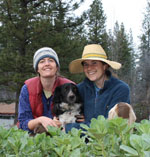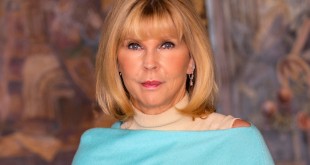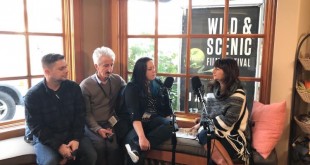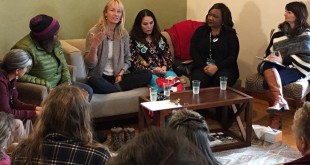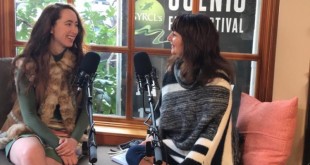Nationally, women are running more farms and ranches, operating more land, and producing a greater value of agricultural products than they were five years ago. Of the 3.3 million U.S. farm operators counted in the 2007 Census, 30.2 percent, more than 1 million, were women.The total number of women operators increased 19 percent from 2002. They are also farming differently. Women tend to run smaller, more specialized farms, focusing on organic and heirloom vegetables and environmentally conscious practices. See Jane Do caught up with the Hein and Ganz on Misty Meadows Farm, a 1.5 acre parcel of land they lease on Purdon Road just outside of Nevada City to find out what the Soil Sisters where up to.
Tell me about the Soil Sisters and how you got started?
“Willow – We were both farming separately last year. I was farming with Honey in the Heart Farm and Maisie was farming with Living Lands Agrarian Network. There were a handful of women farming in the area and we started to get together monthly to discuss some of our experiences and issues, including that we were having a hard time maintaining confidence around the male farmers. We talked about how we really wanted to take charge of our situations. Our gatherings were so positive, so supportive, we wanted to see what could come out of a group of women farmers farming together.”
What is your mission?
“Maisie – We hope women see this as a source of empowerment to start their own projects. Our hope is to be a model of what can happen when two woman come together to lead a life that feels balanced which includes making art, working with our community, teaching and advocating. ”
How does farming, art and women go together?
“Willow – The farm is a muse for me. I’ve been writing a lot of poetry lately; I’m really inspired working with the soil. We wanted to create a forum that would help people, especially women, come together to produce creative work and be inspired.
Maisie – In past years I felt that I had to choose between farming full time and pursuing other more creative passions in my life. It felt like I had to reserve art and reflection as something I could only do during the winter. The message we seem to be getting as new farmers is that to be a legit farmer you almost have to choose one or the other. I began to see that many of us as farmers were sacrificing other areas of our life – like developing healthy personal relationships and our creative endeavors – in order to make our businesses economically viable or “successful.” With Willow, I wanted to create the space where our creative lives were valued as much as our productive, efficient work lives.”
What drew each of you to farming?
“Maisie – I came to it originally because of my love of the outdoors, but also as I became more educated about food production and justice in our country. The summer after my freshman year in college I interned on a farm in New Mexico and really fell in love with the lifestyle and the work. I continued to farm throughout college, interning for a few seasons on organic farms in California after graduating. Last year was the first year I ran the CSA for Living Lands.
Willow – I too have always loved being outside. I grew up in Nevada City where my parents gardened, but I was never that interested. After college I moved to Camptonville to work on a homestead and just had an amazing summer up there. I worked at other farms, and became more involved with the politics of food. ”
Tell me about this new generation of farmers?
“Maisie: One of the biggest impediments to farming is access to land. It is difficult for young people to get into farming because of the price of property and the need for capital to handle the startup costs, which can be high. But I think the desire to farm is strong enough with this new generation that we are finding ways to make it work. That’s why a group of us started Living Lands Agrarian Network last year – as a way to connect landowners with young farmers wanting to grow food for our community.”
It almost seems like farming is an act of social justice.
“Maisie – It is, especially with this new generation of farmers. Farming is a lifestyle as much as a vocation; it ties in our ethics and how we want to live in the world – a lot of young farmers are trying to do good, good for the earth, community and bodies.
Willow – You can’t choose farming because of the money, you have to believe in it.”
What do you want to accomplish with Soil Sisters?
“Willow – I want to inspire other women. I’d also like to develop a new model of farming that values a balanced life. As farmers we work so hard – it gets stressful and easy to lose sight of why you are doing what you are doing.
Maisie – I’d like to live presently and in the moment. It is really enjoyable to focus on the goals for the week and the year: creating a healthy space; taking care of the land; growing the soil; and creating something sustainable. I want to reflect on the work while I’m doing and not (just when there is more time in the winter. “
What is your message to women around the world?
“Maisie – We can all grow more food and create a food system that supports our lives. Farming is connected to so many areas of living and how you choose to eat has huge repercussions on the health of your body and your community.
Willow – Trust yourself. You’ll create something beautiful regardless of how “successful” it is.”
See Jane Do is a multimedia program capturing the stories of everyday women doing extraordinary things for the planet. Catch the one-hour talk radio program on KVMR 89.5FM the first Wednesday of every month at 1 p.m.
Get involved !
5 things you can do today to support women farmers.
- Sign up for a CSA.
- Buy from local growers markets and purchase local produce in grocery stores.
- Grow your own food. Find out how at http://livinglandsagrariannetwork.org/
- Educate yourself on what you are eating and where it is coming from. Where you put your money affects local farmers and local economies. By supporting local farms and farmers, you are supporting local jobs.
- Volunteer or intern on a farm.
 See Jane Do Everyday Women Doing Extraordinary Things
See Jane Do Everyday Women Doing Extraordinary Things
